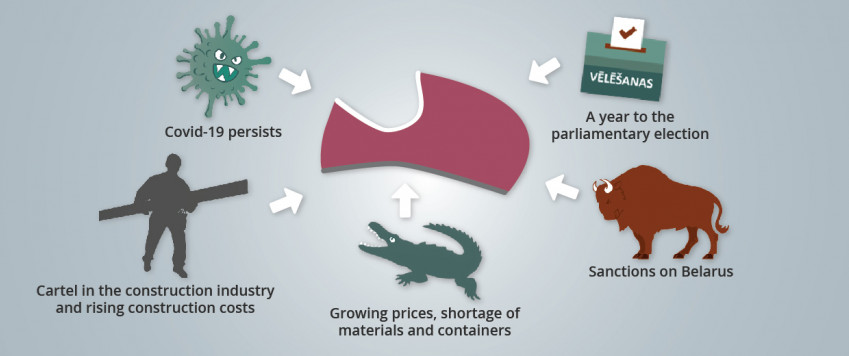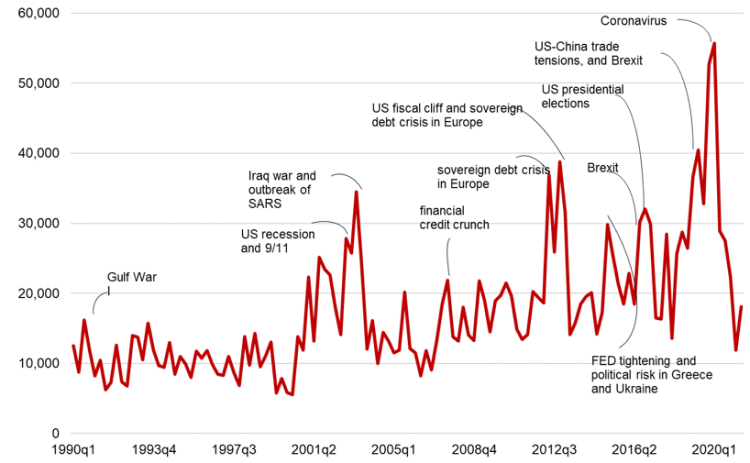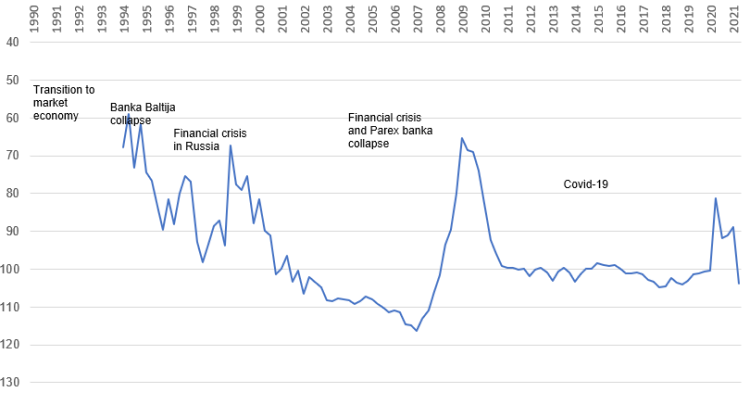Gross domestic product: a peek into the second quarter's data and a lyrical discourse on everythingisbad.lv

The revised data confirm that, in the second quarter, Latvia's gross domestic product (GDP) had managed to recover quite impressively from the heavy burden of the restrictions imposed over the first months of the year. Shopping was getting back to normal, some opportunities to attend theatre performances and bigger sports and cultural events appeared here and there. The overall result: GDP has grown by 11.1% as compared to the second quarter of 2020 and by 4.4% quarter-on-quarter, which is even more than projected by the flash estimate published a month ago.
Private consumption remained the driver of GDP changes through all the waves of the pandemic, dragging the GDP growth down in the periods of tighter restrictions and lifting it up once the precautions were released, allowing to breathe more freely, i.e., go shopping, meet friends and relatives, mingle and enjoy a fine meal at a restaurant. The second quarter has been no exception, and consumption has had an important role to play in GDP growth, albeit this time side by side with exports.
Exports have been sailing through the pandemic much more steadily than consumption, thanks to the record-high grain harvest and exports of articles of wood, with services going through a slump during the periods of tighter restrictions.
Looking back at historical data during the times when we observe such saw-tooth pattern changes in GDP growth seems pointless, and a glimpse of the future seems more enticing. Nevertheless, all forecasts involve a dissection of past events; hence, let's try and take a closer look at everythingisbad.lv and decide how bad is bad and whether we have seen worse.
As to disturbing news, it seems that the fight against Covid-19 has done nothing to reduce the ease at which global tensions seem to be generated; maybe quite on the contrary, emotionally and physically drained by the pandemic, we are on a search for external and domestic enemies. Nevertheless, this is not confirmed by the world uncertainty index. Progress with vaccination and successful adjustment to the new rules of the game have soothed the anxiety around the globe, and the future seems much brighter than a year ago.
Chart 1. World uncertainty index

The Covid-19 pandemic had taken the leading position in the uncertainty measurements of the last two decades. Yet each country may have a different view standing in its own shoes, depending on its direct neighbours and their economic effects, local political and economic developments, natural calamities and other factors. Such uncertainty indexes are estimated differently across countries and regions for a reason. Therefore, it is quite exciting to compare them when standing in Latvia's shoes. Our economy also could be affected more heavily by refugee tensions and sanctions on Belarus than the dramatic events in Afghanistan. Various local "battles" are a source of concern and risks to projections, too.
Chart 2. Latvia's economic sentiment index (inverted; long-term average = 100)

Naturally, the average Latvian has not managed to escape the impact of the pandemic, but the overall sentiment of the economy has been more optimistic than during the financial crisis of 2008–2010. Possibly, because of the government support. The uncertainty levels were even higher at the beginning of 1990s. Although there are no data available for a period that long ago, it is quite clear that the uncertainty of that time was even higher than in 1994 when the economy was already relatively stabilised. Let's not go further down the memory lane this time, where, no doubt, even more difficult times have been experienced.
So, which parts of the anatomy of Latvia's shoes are the ones obstructing a clear view on the projections? For example, restrictions on construction firms found guilty of participating in a cartel and a rise in construction costs might weigh on investment plans. There is also a risk of reckless government spending in an attempt to please voters and get better results from the upcoming parliamentary election next year. In the circumstances of already quite aggressively fighting potential competitors, the temptation could be high. Rising prices, sanctions on Belarus, changes in taxation, bark beetles and weather conditions, and, finally, even the end of the long TV sports anchor career of Lauris Lizbovskis, a well-known Latvian sports journalist.
P.S. The latter "factor" was, of course, chosen merely based on a fairy tale motif of "he, whoever is the first through the castle gates, will marry the shrew princess". And yesterday evening, when opening Delfi news portal to browse through the headlines, there it was. Nothing personal, and I wish all the best, come what may, to both Lauris as well as each and everyone exhausted by uncertainty.
Textual error
«… …»


